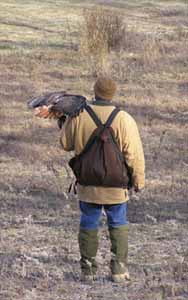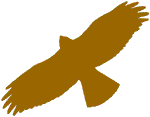 Falconry in Connecticut
Falconry in Connecticut
Is Falconry for You?
Falconry is the sport of hunting small game species with trained raptors. The sport of falconry has a rich history throughout the world and the basic components have changed little over time. Falconry requires a considerable amount of dedication, knowledge, skill, time, and resources. If you are interested in becoming a falconer, you must be prepared to provide for the day-to-day needs of one or more raptors. These needs include feeding, housing, training, exercising, and ensuring that the bird has appropriate veterinary care.
Permitting Requirements
To participate in the sport of falconry, you must obtain a Connecticut falconry permit. A state permit must be issued prior to obtaining or flying a falconry bird. Based upon your experience, knowledge, and ability, residents may apply for a permit to practice falconry as an apprentice class, general class, or master class falconer.
Resident Apprentice Class Falconer: Must be at least 14 years old; have written approval of a parent or guardian if less that 18 years of age; have a sponsor; and maintain a written log describing the instruction provided by your sponsor. An apprentice class falconer may only possess a single red-tailed hawk that has been trapped in the wild in another state. (To locate falconers in the area who may be interested in becoming a sponsor, you should contact a local falconry club or representatives from the North American Falconers Association.)
Resident General Class Falconer: Must be at least 16 years old; submit proof of a minimum of two years experience in the practice of falconry at the apprentice class level and have practiced falconry with their own raptor during at least two hunting seasons; and be recommended for advancement by their sponsor verifying that the applicant satisfies the experience requirement. A general class falconer may possess up to three raptors at any one time.
Resident Master Class Falconer: Must submit proof of having at least five years experience in the practice of falconry at the general class level, and submit written recommendations from three master falconers stating that you meet the qualifications of a master class falconer. A master class falconer may possess up to five raptors at any one time.
Requirements for a Connecticut Resident to Become a Falconer
Before submitting an application to obtain a state permit, you need to take the falconry examination administered by the Connecticut Department of Energy and Environmental Protection. Examinations are offered on a request basis at the DEEP office on 79 Elm St. in Hartford. If you wish to set up an examination appointment, please contact Laurie Fortin at 860-424-3963 or laurie.fortin@ct.gov. Individuals are required to pass this examination with a score of 80% or better. If the passing score is not achieved, a sixty (60) day waiting period is required before retaking the exam.
After passing the examination you will have to:
- Submit an application and a nonrefundable fee of $220.00 for a three-year permit.
- Submit written documentation from the zoning enforcement officer of the municipality in which the raptor housing facility is located which verifies the possession of a raptor and construction of a raptor housing facility, or use of an existing structure to house a raptor complies with all applicable local zoning requirements.
- Certify compliance with facility and equipment requirements.
- Submit proof of having a valid Connecticut firearms hunting license. Please note that in order to obtain a Connecticut hunting license, you must have possessed a resident hunting license within the past five years or successfully completed a Conservation Education and Firearms Safety course.
- Certify that you have not been convicted of violating the falconry laws and regulations of any state or the federal government within a 5-year period.
- Confirm the assistance of a general or master class falconer to serve as a sponsor. (Apprentice class falconers only)
- Pass a field examination. (General or master class falconers only)
Requirements for a Non-resident Falconer to Practice Falconry in Connecticut
Any non-resident falconer who would like to apply for a Connecticut falconry permit must:
- Submit an application and a nonrefundable fee of $28 for a three year permit.
- Submit proof of having a valid falconry permit from the state in which you reside.
- Submit proof of having a valid Connecticut firearms hunting license. Please note that in order to obtain a Connecticut hunting license, you must have possessed a resident hunting license within the past five years or successfully completed a Conservation Education and Firearms Safety course.
- Certify compliance with all federal and resident state laws and regulations governing falconry.
- Certify that you have not been convicted of violating any falconry laws or regulations, or any federal migratory bird laws or regulations within a 5-year period.
Allowable Raptor Species to Be Used for Falconry in Connecticut
(NOTE: No raptors may be taken from the wild in Connecticut.)
- Wild raptors in the subfamily Falconinae or Accipitrinae approved for use in falconry under federal regulation 50 CFR 21.29(e);
- captive-bred raptor species; and
- species of hybrid raptors.
No falconer in Connecticut may possess a raptor in the genus Aquila (true eagles) or the genus Haliaeetus (sea-eagles), or any hybrid thereof, or any raptor listed as endangered, threatened, or of special Concern by the State of Connecticut or the U.S. Fish and Wildlife Service.
Application Materials
Instructions for Completing Application Form for a Falconry Permit: PDF Version
Application Form for a Falconry Permit: Word Form; PDF Version
Attachment B - Raptor Facilities and Equipment Certification Form: Word Form; PDF Version
Attachment C - Zoning Approval Form: Word Form; PDF Version
Attachment D - Sponsorship Form for an Apprentice Class Applicant: Word Form; PDF Version
Contact Information
If you have further questions, please contact Laurie Fortin of the DEEP Wildlife Division by phone at 860-424-3963, via email at laurie.fortin@ct.gov, or by postal mail at 79 Elm Street, Hartford, CT 06106.
Connecticut Falconry Regulations (effective on Dec. 9, 2013)
Content last updated on January 13, 2020.

